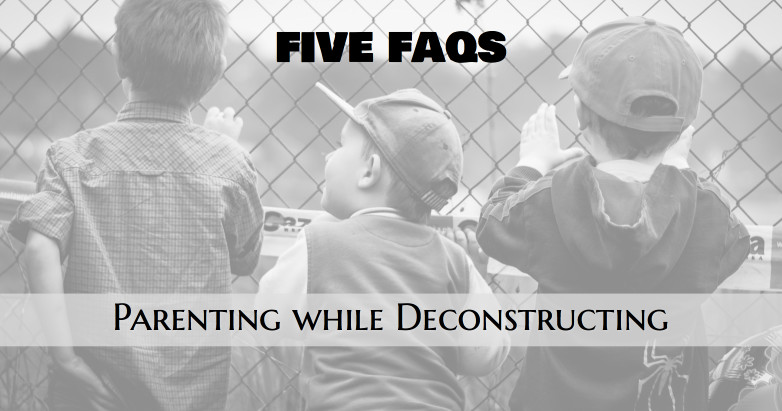Deconstructing, disillusionment, faith shifting—these are all terms to describe the tumultuous process through which we dismantle previously held faith convictions and attempt to rediscover our identity. Add to this the incredible responsibility of parenting—simultaneously building little humans up when we’re falling apart with a faith crisis—can be disorienting.
What I want you to know is that you’re not alone. We’re in this together, figuring out how to wade into unknown territory, raising our children in the ways we ourselves weren’t raised. I’ve connected with thousands of parents who are on similar journeys, and although each family is unique, we share common struggles that come up again and again. I’ve put together an FAQ for those who are parenting while deconstructing, and I hope this will be useful in addressing your own questions.

Q: What kind of faith do I pass on to my children when I am no longer certain of what I believe?
A: The most authentic, honest, beautiful kind. For faith to be true and vibrant, it has to be free. Doctrinal commitments and community obligations turn faith into religiosity, confining the wild wanderings of our soul within carefully drawn borders. Commitment to doctrine and responsibility towards a community isn’t necessarily bad, but it has to be entered into freely by its participating members. The system, the institution, the box of religiosity has to have porous borders and wide open doors where people are invited in and are free to leave.
Those of us who are meandering along the borders or have chosen to exit the doors, we can share our honest journey with our children and model the freedom we’ve embraced for ourselves, not the least because we should extend that liberty to them. Here’s what this faith shifting mother says to her son at a pizza shop,
“You don’t have to match the people who love you. Life, is about exploring and grappling and growing. You’re allowed to think for yourself. You don’t have to live something you don’t believe.”
This is as much true for ourselves as it is for our kids.
Q: When my children bring home Bible Memory Verses from Sunday School, or say they love Jesus, I feel triggered and react instinctively. How can I parent without burdening them with my spiritual baggage?
A: Many of us who grew up in fundamentalist culture struggle with triggers because fundamentalism did not equip us to deal with emotions in a healthy way. Often, what we learned was to repress them, or to project them on to others, or to demand others carry our emotional discomfort.
This is where we must bravely break the cycle and begin to take responsibility for our own emotions so that we can extend dignity and autonomy to our children. Remember, they get to write their own story of faith. Just because we were hurt in a religious environment does not necessarily mean they will. We may experience powerful impulses to protect them from toxic religiosity, but we must do this without stifling their healthy, spiritual exploration.
The long game plan is to find healing in your own spiritual wounds. When we engage in the hard work of understanding the source of our pain, we will be better able to recognize our triggers and process it in a healthy manner without projecting it onto our children. In the heat of the moment, try to take a deep breath and give yourself and your child time to think and process before responding appropriately. Both faith and parenting are marathons. We can pace ourselves and take our time before moving forward again.
Lastly, not transferring our spiritual baggage does not mean we repress our pain and “act tough” for our children. Our goal is to not project our pain so that they shoulder our burden, but when we’ve done the inner work of owning our story, then we can share it honestly with our children in age appropriate ways.
Q: I feel like I am questioning everything I was raised with, I’m not sure there are any values left for me to give to my kids.
A: This is why sometimes I don’t like the vocabulary of “deconstruction,” because it has the connotation that we are tearing something down, reducing our faith to a rubble. The reality is quite the opposite. When we deconstruct, we are growing in our convictions that something has gone awry. When you are against something, it is because you are for something else even more. Dig deeper into why you are deconstructing. Do you no longer believe in an angry God of wrath who will punish God’s Son to save us from our sins? This might mean you believe even more strongly in a God who is not vengeful. Do you no longer believe gay people are choosing to sin? This means you believe even more strongly that who people love is not something religion should police.
Fatih shifting, as hard as it can be, is a wonderful gift to help us gain clarity to what we really hold to be true. Don’t settle for the less than the truest thing to give to your children.
Q: I just can’t go to my church anymore. Am I robbing my children of growing up in community?
A: How much are you willing to work for authentic community? I find a lot of people stay in churches because they need the anchor of a community identity. They stay because there is a ready-made group of friends and things to do on Wednesday nights (Bible studies) and events on the weekends for the family to attend. I understand that impulse because we are socially oriented beings and relationships drive our meaning in life. However, if the cost of maintaining social status is that you have to pretend to be someone you’re not, then is it authentic community? Meaningful relationships require both parties show up as our true selves. Do we want to model true community or superficial relationships that help us maintain a social facade to our children?
If your church is a toxic place, or even simply a place you do not fit, you aren’t robbing your children of community, you are showing them how much you’re willing to strive for being true to yourself. That is a strong foundation to give to your children so they grow into people who aren’t afraid to be real.
I know it may be hard in very religious environments (i.e. Bible Belt), but increasingly there are opportunities to find community outside of faith institutions. People in all sectors of life are longing for connection. Find what allows you and your family to be authentically you, for a place to belong.
Q: How can I parent my children when I am at a different phase of deconstruction than my spouse? How do I deal with fundamentalist family and relatives who have regular contact with my children?
A: The good news is it’s generally a good thing for children to be exposed to a diversity of religious beliefs. The more they learn there are different ways to worship, believe, practice their faith, the more empowered they can be to choose the path for themselves. It may be easier to raise children in homogenous households but in the long run, the myopic worldview will limit their capacity to practice a fuller, more healthy spirituality.
The bad news is it does require more work to maintain civility, respect, and draw healthy boundaries when you operate in an inter-religion/worldview family. Especially if some of your family member are fundamentalists because they are notorious for resisting boundaries. My best advice is to refuse to engage in drama. Know your boundaries, communicate them clearly, and act accordingly. If you do not want your child to go to a hell-and-brimstone church with their grandparents, let them know respectfully but refuse to negotiate on that line you’ve drawn. They will eventually learn to respect your rules and once again, this is a beautiful thing to model for your children—that they may learn to draw healthy boundaries in the relationships in their lives.
Get a free download of a Christian parenting manifesto that helps us guide children into healthy spirituality + a guide on How to Raise a Feminist Son + the most helpful parenting resources with progressive values.












